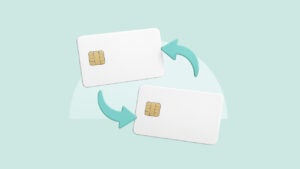I received a store card I didn’t apply for. Should I cancel it?

Key takeaways
- If you received a store credit card you didn’t sign up for, that means someone else likely signed you up without your permission.
- Issuing a card without your permission violates the Truth in Lending Act and is considered fraud.
- You should cancel the card immediately and take steps to protect your finances, such as having the card’s information removed from your credit reports and checking your other credit card accounts for signs of fraudulent activity.
Retailers typically offer sales and promotions during the holiday shopping season, and sales clerks will often try to sell you on their store cards as a way to finance those deals. But what if you’ve been signed up for a store card without your knowledge? Here’s how that might’ve happened, as well as what to do about it:
Why did you receive a store card you didn’t apply for?
If you receive a store credit card you didn’t apply for, you should start by looking at the card closely. Sometimes, stores and issuers will send promotional cards meant to look like real credit cards to entice consumers to sign up.
If you’re sure that the card is real, then you’re likely dealing with one of two scenarios:
- Someone — like maybe that pushy sales clerk — signed you up for a card without your permission.
- Someone signed up for a store credit card by stealing your identity.
Either way, you’ll have to take steps to deal with the issue quickly, starting by understanding your rights as a consumer.
Truth in Lending Act protections
A retail store or card issuer cannot issue you a card without your express permission, per the Truth in Lending Act (TILA). Issuers can only approve you for a card if you made an oral or written request or applied for the card. They can, however, issue you a card without your express permission when it comes time to renew your current card or if you need a substitute for an existing card.
Examples of store credit card fraud
There have been instances of the Consumer Financial Protection Bureau (CFPB) receiving complaints from consumers saying they received store cards in the mail even though they declined offers to open these accounts at the store or over the telephone.
This could happen if you shared personal information, including your Social Security number (SSN), with store personnel, and they decided to sign you up for a card. They could have gotten this input from you for another reason and then used it to approve you for the card without your knowledge. This sort of misuse of information violates the TILA and is considered fraud.
But there’s also another reason you might’ve gotten a store credit card that doesn’t involve an employee. If someone stole your identity and is using it to open up credit accounts, you could’ve received a store credit card that the thief signed up for. Identity theft is a serious issue and also qualifies as fraud.
Keep in mind: If you’ve refused to sign up for a store credit card and a sales clerk still wants to know your Social Security number, that’s a red flag. Store employees don’t otherwise need that information, especially if they just want to sign you up for a loyalty card, which only provides you with special promotions.
What to do with the store credit card you didn’t sign up for
Now that you know what kinds of fraudulent situations you might be facing, you can deal with that unsolicited store credit card. Here are some general steps that can help:
1. Cancel the card
For starters, call up the issuer and ask to have your credit card canceled. If you’re not sure who the issuer is for the credit card, reach out to the store. Be careful not to give personal information, such as your SSN, to anyone who picks up.
Take notes during your calls and ask for proof of your cancellation request to be emailed to you.
Ask the issuer not to report information about this account to the credit bureaus, either. You should also let them know that the card was issued to you fraudulently.
2. Get the inquiry and information removed from your credit reports
Because you didn’t sign up for the card, you want to ensure that it doesn’t harm your credit score or add fraudulent information to your credit report. The three credit bureaus — Equifax, Experian and TransUnion — allow consumers to file disputes and have incorrect information removed, but they each have a different process for doing so. Visit the websites of each credit bureau and go through the dispute process with each one if the card’s information has shown up on your report.
3. Report the fraud to the CFPB
The CFPB actively investigates consumer issues with credit cards, including fraud. You can file a complaint on their website.
Keep in mind: The Trump Administration’s attempts at closing down the CFPB in 2025 has heavily impacted the organization’s efficiency and reach. Consider following up your CFPB complaint with one to your local District Attorney.
4. Check your credit report for other issues
Check your credit report periodically until the fraudulent information has been removed. In addition, you should also begin cleaning up your credit reports and auditing your accounts. You’re legally entitled to free credit reports weekly from each of the three major credit bureaus, and you can get those reports by visiting the government-authorized website AnnualCreditReport.com.
When you get your credit reports, read over them carefully to make sure there isn’t any other incorrect information on them. As an added measure, you can also freeze your credit reports so that no one can look at them or request new lines of credit using your information. Credit monitoring services are another way to keep an eye on your reports. This is especially important if you were issued that store credit card due to an identity theft problem.
To be on the safe side, you should check out your other accounts and make sure no fraudulent transactions have occurred recently.
The bottom line
A store cannot issue you a card without your permission. However, store personnel could use the input you provide without explicitly informing you that you are applying for a store card. Identity thieves can also sign up for store credit cards using your information.
If this happens to you, cancel the card and have its information removed from your credit reports by filing disputes. If you’re a victim of identity theft, you should also take extra measures to make sure your finances are safe, such as freezing your credit reports and checking over your recent transactions. You can also file a complaint with the CFPB.
Why we ask for feedback Your feedback helps us improve our content and services. It takes less than a minute to complete.
Your responses are anonymous and will only be used for improving our website.







